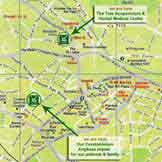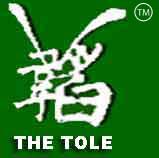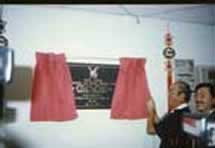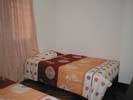Neuro Acupuncture and Ancestral Formula Chinese Herbal Medicine |
|
|
|
|
| Adenomyosis |
The most common symptom of adenomyosis is abnormally heavy menstrual bleeding. Severe cramps are a frequent accompaniment when the adneomyosis exceeds 80% or more of the uterus.
There is usually globular enlargement in the uterus on pelvic examination and the uterus may be somewhat boggy if the adenomyosis is advanced. The posterior wall of the uterus is more commonly involved than the anterior.
Adenomyosis and particularly adenomyomas are commonly misdiagnosed as fibroids, because the symptoms are similar. The uterus is often enlarged, and ultrasound imaging often fails to distinguish the two conditions. Adenomyosis has a poorly defined border and is not “shelled out” as leiomyomas may be. |
| Adrenal Adenomas |
Adrenal glands are situated over the top of each kidney. Adrenal adenomas are non-cancerous tumors of the Adrenal gland. They arise from the outer layer of the gland, called the Adrenal cortex. The Adrenal cortex normally makes hormones that belong to the steroid family. If an Adrenal adenoma produces hormones, it is called 'functioning', though this term makes them sound healthy when in fact such adenomas often produce excessive amounts of steroid hormones. If an adenoma does not produce a hormone it is termed 'non-functioning'.
Adrenal adenomas are often found by chance during a scan of the body for an unrelated condition. However, all Adrenal masses (lumps) need careful evaluation to ascertain their nature, especially to see whether they are producing hormones. If an Adrenal adenoma that is producing hormones is not treated, it can have serious consequences.
The cause of Adrenal adenomas is unknown, but the current accepted theory is that they arise because of mutations (changes) in certain genes (which are not yet identified). Adrenal adenomas are more common in some inherited diseases, including multiple endocrine neoplasia type I, Beckwith-Wiedemann syndrome and the Carney complex. Also, patients with genetic defects of the body systems that manufacture steroid hormones (eg congenital Adrenal hyperplasia), especially those whose condition is poorly controlled, may have a higher risk of Adrenal adenomas. However, most Adrenal adenomas are not linked with an inherited disease. The likelihood of developing an adenoma increases with age.
About 6 per cent of patients over 60 years of age have an Adrenal adenoma. |
| Symptom of Adenomyosis |
| Most patients with an Adrenal adenoma will have no symptoms caused by the adenoma. However, even in symptom-free patients, proper investigations reveal that many Adrenal adenomas produce abnormal amounts of steroid hormones to some degree. The commonest abnormality is the production of too much cortisol, a steroid hormone involved in the response to stress and energy balance. Adenomas that produce massive amounts of steroid hormones will cause obvious symptoms. Large amounts of cortisol will cause Cushing's syndrome, too much aldosterone causes Conn's syndrome, and an excess of male sex steroids causes acne and hair growth. Very rarely, bleeding can occur into adenomas and cause pain in the flanks or back. |
| Diagnosed of Adenomyosis |
Most Adrenal adenomas are discovered by chance when an abdominal computed-tomography (CT) or magnetic-resonance imaging (MRI) scan is done for unrelated symptoms.
Others posibilities
More rarely, a mass in the Adrenal gland is cancer that has spread from another part of the body, usually the lung or bowel (ie 'metastatic' cancer). Generally, the origin of the cancer is clear from the clinical examination or from simple tests such as a chest X-ray. In addition, the CT or MRI appearance of metastatic cancer in the Adrenal gland can be distinguished from a benign Adrenal adenoma by use of specialised radiology. An Adrenal mass might also be a cancer of the Adrenal cortex (adrenocortical carcinoma). Although they are very rare, these cancers are often large and can produce a combination of hormones.
Adrenal masses can also arise from the inner part of the Adrenal gland, called the Adrenal medulla, which is part of the nervous system and produces the hormones Adrenaline and norAdrenaline. Tumours of the Adrenal medulla are called phaeochromocytomas, and they also can be distinguished from adenomas by specialised scanning techniques as well as by blood and urine tests for Adrenaline and nor-Adrenaline. |
Please feel free to contact or email us for further details at : |
THE TOLE ACUPUNCTURE & HERBAL MEDICAL CENTRE SDN BHD.
Lot 2.01, 2nd Floor,
Medical Specialist Floor,
Menara KH (Menara Promet),
Jalan Sultan Ismail, 50250 Kuala Lumpur.
Malaysia
Tel No : +603-21418370 / +603-21451671
Whatsapp (only): +6012-7688284
Acupuncture Time : |
| Operating Hours : |
| Monday to Friday : 9:30 am to 7:00 pm |
| Tuesday : 10:00 am to 7:00 pm |
| Saturday : 9:00 am to 6:00 pm |
| Sunday : 12:00 pm to 4:00 pm |
| *(Malaysia Time) |
| |

|
|
Sending of Herbs and Herbal Medicine are Available to all Countries. PROCEDURE:- |
Intensive Herbal and sending of Herbal Medicine are Available to all Countries. PROCEDURE:-
1. E-mail to us with all your medical reports ,
2. Then we will advise you on the herbal preparation and or come for the intensive Neuro Acupuncture,
3. After we have your total conditions picture then you can bank in the money and then we will courier the medicine herbs to you.
It will takes about 3 to 5 working days.
Then we can guide you from here with e-mail, you have to update us on your progress.
Please use Online Transfer
Bank name : Ambank (M) Berhad .
Bank account name : The Tole Acupuncture-Herbal Medical Centre Sdn Bhd
* please email to us request for more details. |
|
|
The Tole Officially Opened by our Health Minister. |
|
|
The above picture is taken during the New Medical Centre Opening Ceremony by our Health Minister YAB Dato. Lee Kim Sai in 1993 January 31st. |
|
|
| |
| |
Share us with your friends. |
They may need our assistance! |

LIKE OUR FACEBOOK PAGE! |
| |

FOLLOW OUR TIKTOK PAGE! |
| |

FOLLOW OUR INSTAGRAM PAGE! |
| |
|
| |
Podemos enviar hierbas a tu domicilio mediante: |
|
|
| |
Contact Us |
THE TOLE
Neuro Acupuncture-HERBAL MEDICAL
CENTRE SDN BHD
Lot 2.01, 2nd Floor, Medical Specialist Floor, Menara KH (Menara Promet), Jalan Sultan Ismail, 50250 Kuala Lumpur
Tel: +603-21418370
+603-21451671
Whatsapp (only): +6012-7688284
* E-mail consultation with Master and Assistant.
Ask by e-mail
|
|
|
| |
Accommodation |
|
CONDOMINIUM |
|
| |
|
|
| |
|







